Items filtered by date: October 2023
Managing Sesamoiditis
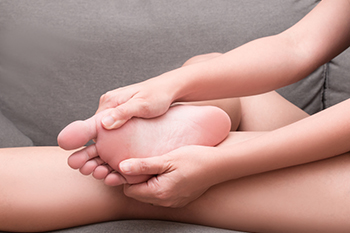
Sesamoiditis is a chronic condition caused by frequent pressure and resulting in irritation and painful inflammation of the sesamoid bones and surrounding tissues. Sesamoid bones are small bones in the feet that are embedded within tendons and play a vital role in foot biomechanics. Sesamoid bones are under the metatarsophalangeal, or MTP, joint of the big toe. These tiny bones act as a fulcrum of sorts, providing stability to the foot and offering protection and shock absorption for the nearby joints and tendons. Sesamoiditis can be caused by various factors, including damage to the sesamoid bones themselves, joint deformities, such as bunions, as well as conditions like gout, osteoarthritis, and osteoporosis. Certain lifestyle factors, consisting of wearing frequently high heels or engaging in high impact sports, can aggravate the sesamoid bones and result in pain. Differences in arches, body weight, and the size of sesamoids can add to the risk of inflammation. Symptoms typically start mildly and can worsen with continued strain, with pain often concentrated in the ball of the foot. If you believe you are suffering from sesamoiditis, it is suggested that you make an appointment with a podiatrist for an evaluation and options for treating this condition effectively.
Sesamoiditis is an unpleasant foot condition characterized by pain in the balls of the feet. If you think you’re struggling with sesamoiditis, contact one of our podiatrists of Parkwood Podiatry. Our doctors will treat your condition thoroughly and effectively.
Sesamoiditis
Sesamoiditis is a condition of the foot that affects the ball of the foot. It is more common in younger people than it is in older people. It can also occur with people who have begun a new exercise program, since their bodies are adjusting to the new physical regimen. Pain may also be caused by the inflammation of tendons surrounding the bones. It is important to seek treatment in its early stages because if you ignore the pain, this condition can lead to more serious problems such as severe irritation and bone fractures.
Causes of Sesamoiditis
- Sudden increase in activity
- Increase in physically strenuous movement without a proper warm up or build up
- Foot structure: those who have smaller, bonier feet or those with a high arch may be more susceptible
Treatment for sesamoiditis is non-invasive and simple. Doctors may recommend a strict rest period where the patient forgoes most physical activity. This will help give the patient time to heal their feet through limited activity. For serious cases, it is best to speak with your doctor to determine a treatment option that will help your specific needs.
If you have any questions please feel free to contact our offices located in Brunswick and Hinesville, GA . We offer the newest diagnostic and treatment technologies for all your foot and ankle needs.
Erythromelalgia in the Feet
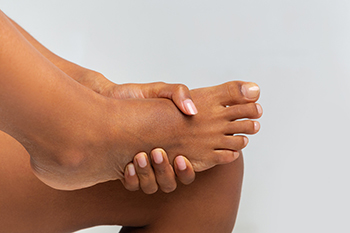
Erythromelalgia is a genetic condition characterized by recurrent bouts of pain, redness, and swelling, primarily in the hands and feet. These episodes are frequently triggered by elevated body temperature, which can result from activities like exercising or being in a warm environment. Consumption of alcohol or spicy foods can also provoke these painful episodes. Oddly enough, even wearing warm socks or tight shoes can induce debilitating foot pain, hindering daily activities like walking, wearing shoes, or functioning normally. The signs and symptoms of erythromelalgia in the feet typically emerge during childhood, although some mildly affected individuals may experience their initial episode later in life. As the condition progresses with age, the redness and discomfort may become chronic, extending from the feet to the entire legs. Erythromelalgia is often classified as a type of peripheral neuropathy, impacting the peripheral nervous system. This system links the brain and spinal cord to muscles and sensory receptors responsible for detecting sensations such as touch and pain. If you think you might have erythromelalgia or any type of foot pain, it is suggested that you make an appointment with a podiatrist for a proper diagnosis and treatment.
Foot Pain
Foot pain can be extremely painful and debilitating. If you have a foot pain, consult with one of our podiatrists from Parkwood Podiatry. Our doctors will assess your condition and provide you with quality foot and ankle treatment.
Causes
Foot pain is a very broad condition that could be caused by one or more ailments. The most common include:
- Bunions
- Hammertoes
- Plantar Fasciitis
- Bone Spurs
- Corns
- Tarsal Tunnel Syndrome
- Ingrown Toenails
- Arthritis (such as Gout, Rheumatoid, and Osteoarthritis)
- Flat Feet
- Injury (from stress fractures, broken toe, foot, ankle, Achilles tendon ruptures, and sprains)
- And more
Diagnosis
To figure out the cause of foot pain, podiatrists utilize several different methods. This can range from simple visual inspections and sensation tests to X-rays and MRI scans. Prior medical history, family medical history, and any recent physical traumatic events will all be taken into consideration for a proper diagnosis.
Treatment
Treatment depends upon the cause of the foot pain. Whether it is resting, staying off the foot, or having surgery; podiatrists have a number of treatment options available for foot pain.
If you have any questions, please feel free to contact our offices located in Brunswick and Hinesville, GA . We offer the newest diagnostic and treatment technologies for all your foot care needs.
The Importance of Determining the Root Cause of Ankle Pain
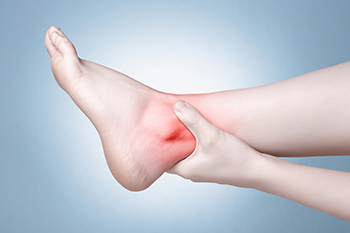
Ankle pain is a complex issue that requires accurate diagnosis for effective treatment. Ankle pain can have various causes, including degenerative arthritis, which can be linked to past injuries like ankle sprains or fractures. Common misconceptions arise when patients are diagnosed solely based on X-ray evidence of degeneration. The pain could be due to other issues such as subtalar joint dysfunction, sinus tarsi syndrome, or peroneal tendinopathy. Nonsurgical treatments for ankle arthritis can consist of orthotic devices and dietary supplements. These treatments aim to relieve pain, improve joint health, and potentially delay the progression of arthritis. If you have recurrent ankle pain, it is suggested that you make an appointment with a podiatrist for a comprehensive evaluation to determine the root cause accurately.
Ankle pain can have many different causes and the pain may potentially be serious. If you have ankle pain, consult with one of our podiatrists from Parkwood Podiatry. Our doctors will assess your condition and provide you with quality foot and ankle treatment.
Ankle pain is any condition that causes pain in the ankle. Due to the fact that the ankle consists of tendons, muscles, bones, and ligaments, ankle pain can come from a number of different conditions.
Causes
The most common causes of ankle pain include:
- Types of arthritis (rheumatoid, osteoarthritis, and gout)
- Ankle sprains
- Broken ankles
- Achilles tendinitis
- Achilles tendon rupture
- Stress fractures
- Tarsal tunnel syndrome
- Plantar fasciitis
Symptoms
Symptoms of ankle injury vary based upon the condition. Pain may include general pain and discomfort, swelling, aching, redness, bruising, burning or stabbing sensations, and/or loss of sensation.
Diagnosis
Due to the wide variety of potential causes of ankle pain, podiatrists will utilize a number of different methods to properly diagnose ankle pain. This can include asking for personal and family medical histories and of any recent injuries. Further diagnosis may include sensation tests, a physical examination, and potentially x-rays or other imaging tests.
Treatment
Just as the range of causes varies widely, so do treatments. Some more common treatments are rest, ice packs, keeping pressure off the foot, orthotics and braces, medication for inflammation and pain, and surgery.
If you have any questions, please feel free to contact our offices located in Brunswick and Hinesville, GA . We offer the newest diagnostic and treatment technologies for all your foot care needs.
Congenital Foot Anomalies
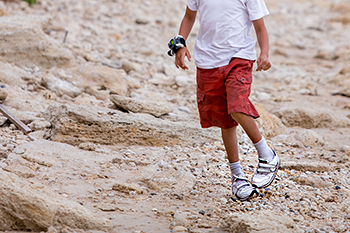
Toe defects can be present at birth, known as congenital anomalies. These can range from incomplete formation to extra toes. One cause could be amniotic band syndrome, where strands from the amniotic sac entangle around the fetus, restricting growth. Polydactyly refers to toes, which can be fully functional or just a flesh nub. Syndactyly involves webbing or fusion of toes. In simple cases, only soft tissues are fused, but in complex cases, bones are also fused. These defects can also be part of genetic syndromes such as Apert syndrome. Diagnosis often involves ultrasounds before birth and X-rays after birth. Genetic testing may also be done, particularly if other family members have similar issues or a genetic syndrome is suspected. Treatment usually involves surgery to correct the defect or remove extra digits. Prosthetics may be used for missing toes. If your child has been born with extra toes, it is suggested that you make an appointment with a podiatrist as quickly as possible for the best treatment for your child that will help ensure growing up with little to no impact on their mobility.
Congenital foot problems require immediate attention to avoid future complications. If you have any concerns, contact one of our podiatrists of Parkwood Podiatry. Our doctors can provide the care you need to keep you pain-free and on your feet.
Congenital foot problems are deformities affecting the feet, toes, and/or ankles that children are born with. Some of these conditions have a genetic cause while others just happen. Some specific foot ailments that children may be born with include clubfeet, polydactyly/macrodactyly, and cleft foot. There are several other foot anomalies that can occur congenitally. What all of these conditions have in common is that a child may experience difficulty walking or performing everyday activities, as well as trouble finding footwear that fits their foot deformity. Some of these conditions are more serious than others. Consulting with a podiatrist as early as possible will help in properly diagnosing a child’s foot condition while getting the necessary treatment underway.
What are Causes of Congenital Foot Problem?
A congenital foot problem is one that happens to a child at birth. These conditions can be caused by a genetic predisposition, developmental or positional abnormalities during gestation, or with no known cause.
What are Symptoms of Congenital Foot Problems?
Symptoms vary by the congenital condition. Symptoms may consist of the following:
- Clubfoot, where tendons are shortened, bones are shaped differently, and the Achilles tendon is tight, causing the foot to point in and down. It is also possible for the soles of the feet to face each other.
- Polydactyly, which usually consists of a nubbin or small lump of tissue without a bone, a toe that is partially formed but has no joints, or an extra toe.
- Vertical talus, where the talus bone forms in the wrong position causing other bones in the foot to line up improperly, the front of the foot to point up, and the bottom of the foot to stiffen, with no arch, and to curve out.
- Tarsal coalition, when there is an abnormal connection of two or more bones in the foot leading to severe, rigid flatfoot.
- Cleft foot, where there are missing toes, a V-shaped cleft, and other anatomical differences.
- Macrodactyly, when the toes are abnormally large due to overgrowth of the underlying bone or soft tissue.
Treatment and Prevention
While there is nothing one can do to prevent congenital foot problems, raising awareness and receiving neonatal screenings are important. Early detection by taking your child to a podiatrist leads to the best outcome possible.
If you have any questions please feel free to contact our offices located in Brunswick and Hinesville, GA . We offer the newest diagnostic tools and technology to treat your foot and ankle needs.
Facts About Children Walking on Tiptoe
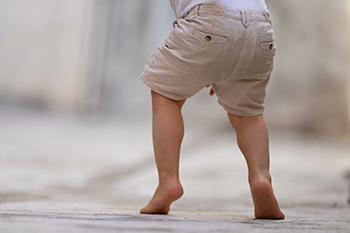
While occasional tiptoe walking is normal in toddlers who are exploring their bodies, persistent tiptoe walking may signal underlying issues that require attention from a podiatrist. One common cause is idiopathic toe walking, as sometimes children walk on tiptoe without any apparent reason. This condition usually resolves by the time the child is three years old, but persistent cases may require evaluation. Another potential cause is a tight Achilles tendon, as a shortened Achilles tendon can make it uncomfortable for a child to place their heels on the ground. Some children with sensory processing disorders may prefer tiptoe walking due to heightened sensitivity in their feet. Tiptoe walking can lead to muscle imbalances and joint issues in the long run, which may affect a child's balance and coordination, potentially leading to falls and injuries. If you notice that your child is frequently walking on tiptoe, it is suggested that you make an appointment with a podiatrist for a thorough evaluation and appropriate treatment. Early intervention can help your child develop a healthier, more comfortable gait.
Making sure that your children maintain good foot health is very important as they grow. If you have any questions, contact one of our podiatrists of Parkwood Podiatry. Our doctors can provide the care you need to keep you pain-free and on your feet.
Keeping Children's Feet Healthy
Having healthy feet during childhood can help prevent medical problems later in life, namely in the back and legs. As children grow, their feet require different types of care. Here are some things to consider...
Although babies do not walk yet, it is still very important to take care of their feet.
Avoid putting tight shoes or socks on his or her feet.
Allow the baby to stretch and kick his or her feet to feel comfortable.
As a toddler, kids are now on the move and begin to develop differently. At this age, toddlers are getting a feel for walking, so don’t be alarmed if your toddler is unsteady or ‘walks funny’.
As your child gets older, it is important to teach them how to take care of their feet.
Show them proper hygiene to prevent infections such as fungus.
Be watchful for any pain or injury.
Have all injuries checked by a doctor as soon as possible.
Comfortable, protective shoes should always be worn, especially at play.
If you have any questions please feel free to contact our offices located in Brunswick and Hinesville, GA . We offer the newest diagnostic and treatment technologies for all your foot and ankle needs.
